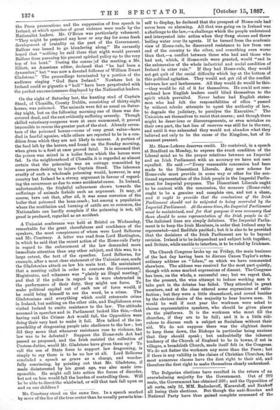Mr. Courtney stood on the same line. In a speech
marked by more of the fire of the true orator than he usually permits him- self to display, he declared that the prospect of Home-rule had ' never been so alarming. All that was going on in Ireland was a challenge to the law,—a challenge which the people understood and interpreted into action when they flung stones and threw boiling water over its agents. If he turned from the academic view of Home-rule, he discovered resistance to law from one end of the country to the other, and something even worse than that,—a conflict between those who had and those who. had not, which, if ]Iome-rule were granted, would "end in the submersion of the whole industrial and social condition of Ireland in utter ruin." If they had Home-rule, they would not get quit of the social difficulty which lay at the bottom of this political agitation. They would not get rid of the conflict between law and lawlessness. All they would do would be this, —they would be rid of it for themselves. He could not com- prehend how English leaders could blind themselves to the- spirit which prevailed. Never before had English states- men who had felt the responsibilities of office "passed by without rebuke attempts to upset the authority of law, to degrade the judiciary, to paralyse the Executive." The Unionists set themselves to resist that course; and though there might be desertions or discouragements, or even mistakes on their own part, the last line of reserves was still far in the rear,. and until it was exhausted they would not abandon what they believed not only to be the cause of the Kingdom, but of its meanest peasant.


































 Previous page
Previous page